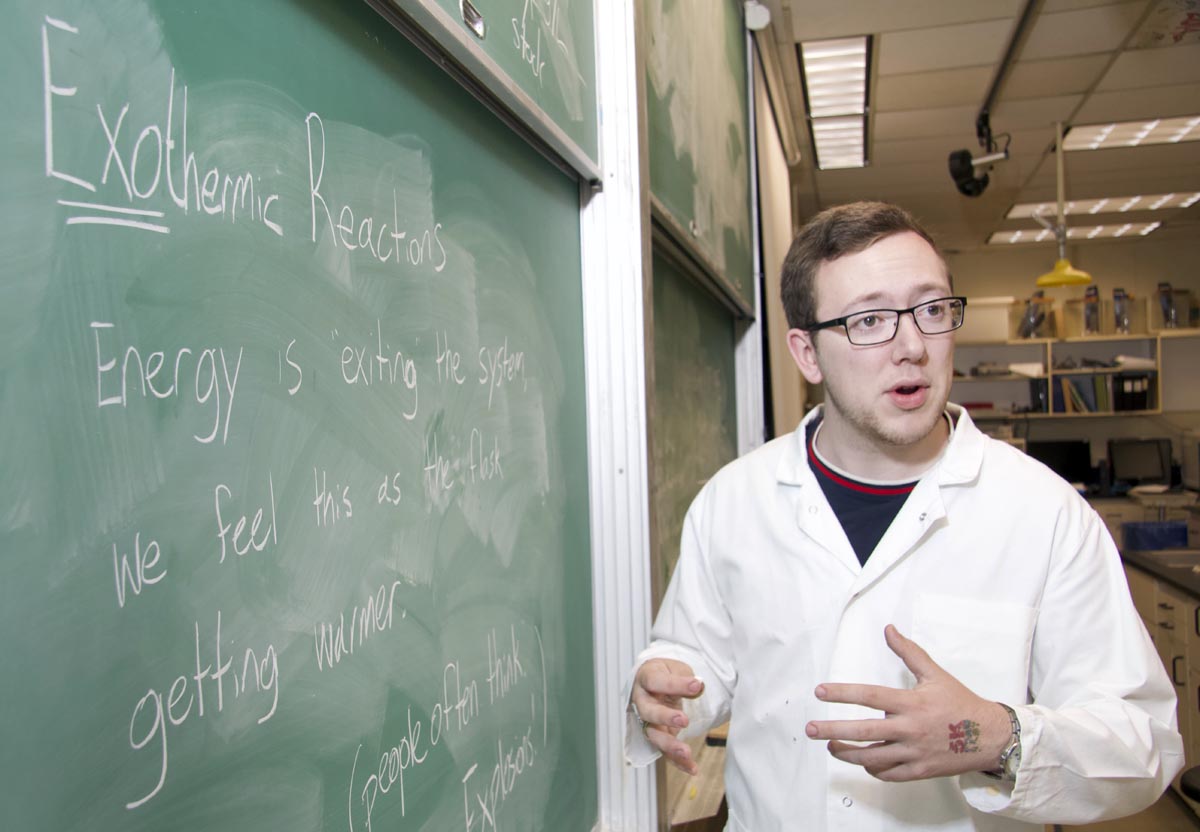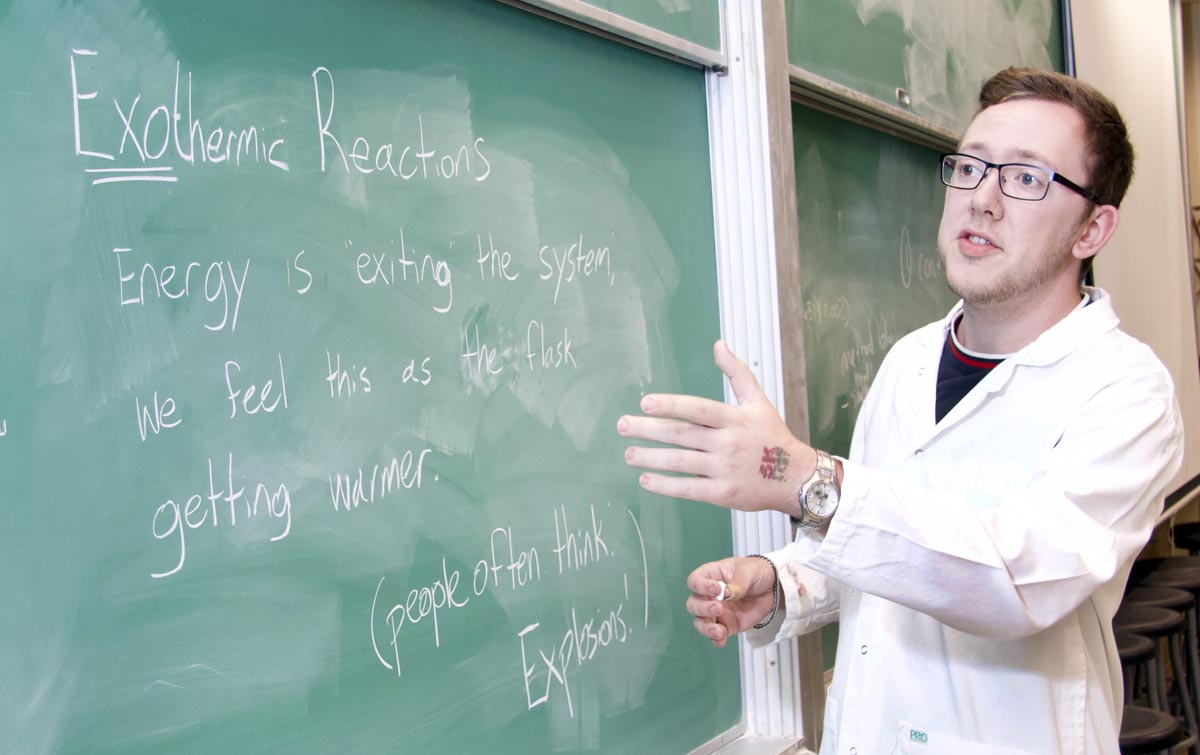When Will Primrose isn’t combining chemicals, he’s mixing words. The third-year chemistry student has opted for a minor that’s not typical among his science peers: creative writing.
“The technical skills of writing have helped me develop succinct language and to be specific with the words I choose,” said Primrose, whose goal is to teach at the university level — while still pursuing his passion for writing, music and poetry.
“With my lab reports, creative writing has helped me describe things better and to be careful with what I say. Instead of going on with too much flowery language, I’ve learned to get to the point: This is what is happening and these are the correct words to use.”
His science background has influenced his creative writing. And vice versa,
“One of the interesting things is that I’m one of the only physical science majors (doing a creative-writing minor), so I can write about things in the lab or things around us and find a more technical viewpoint to what I write about,” he said.
“A lot of people like to explore feelings in poetry or writing, which I do find interesting. But I like exploring the physical world—the descriptions of how things exist as they are, not what we want them to be. Writing poetry on that has been a lot of fun. Looking at science from more of an arts standpoint, rather than just looking at the data.”
Pursuing opportunities
Primrose has jumped at opportunities that will help him become a teacher. In his first year, he took an English course with Ginny Ratsoy in which he researched the impacts of study abroad using quantitative tools to log such measurables as whether students graduated sooner and whether they got better grades. Impressed with his findings, Ratsoy encouraged Primrose to present at TRU’s Undergraduate Research and Innovation Conference, then suggested he apply to have the paper accepted into the conference’s permanent journal. It was and Primrose has seen his paper downloaded around the world.

For the past two summers, he has been a counsellor with the EUReKA! science camps. He acts as a fun older brother while sharing big concepts and explaining them using the words that work best.
“It is amazing to me the creativity the kids have toward science. When we ask them, ‘Why do you think this is happening?’ it doesn’t really matter whether their answer is correct or not. The thing I care about is that they have such a creative way of thinking. I’m left saying, ‘Wow, it’s fascinating that you would think that way.’ We can then test their answer and be able to learn so much more from that.”
Bonus questions
The Newsroom did a Q and A with Primrose:
Being a scientist and writer, you must look at the world as a futurist. What’s in store?
“I would love to see flying cars, but I think the future is going to be a lot of small changes like artificial intelligence (AI) that will revolutionize humanity in the long run. It’s not going to be Battlestar Galactica. We’ll see a lot of small changes in the way we go about our day-to-day lives. Self-driving cars we will see more of and I think most people will be pushing for them, because in the long run, they are safer because human error is reduced.”
Some argue that AI is dehumanizing. What do you think?
People have been complaining about the newest technology since time immemorial. Being able to count was once important, but now we have calculators on our phones, we have them in our computers and most of the time we have more complex computer programs that can run even more complex data than just counting and multiplication. So when it comes to the question of is it dehumanizing? I think it’s doing the opposite because if our brains don’t have to be used for memorizing trivial facts and doing times tables, you can start thinking about what does it mean to be human? What art do I enjoy? Why do I like listening to music? What is the joy I get from going to the orchestra or from going to a country music concert?
When it comes to your writing, how do you deal with the painful task of deleting chunks of words?
“You get much better at realizing you’re writing for the end product, so the tough decisions along the way are ultimately to make the story better. If you want anyone to read your story in the end, you have to keep your reader in mind and ask, What’s going to be interesting to them and how can I make the best story for them to engage in? It can be tough to delete 500 words here and there, but in doing so, you can usually add 1, 000 words later that are better than what you had originally….
“I’m into creative writing more for the interest, but if I finish my manuscript and send it off to a publisher and something happens, awesome, but I’m mostly doing it for my own enjoyment. I get a lot of satisfaction from doing the writing.”
What did your study abroad research reveal?
“What I learned was that students started learning for the sake of knowledge and that’s what they were reporting—that school was a lot more interesting. As a result of that, they ended up going a lot further after their degrees—they did better at their jobs later or they went off to grad schools. Some people said because of the experience they got better grades, but it wasn’t statistically significant enough to say that if you study abroad your grades are going to go up 10 per cent. Some students developed different interests because of the experience and that prompted them to change parts of their degree focus or take different courses. That led to it taking longer for them to complete the degree because they basically had to take additional courses because they found something they liked.”
Why go outside of what’s comfortable?
“The more you can learn about the world around you, the more you will be able to engage with it and it makes the world a lot brighter. There’s more around that you can engage with and diversity is always a strength. We’re very fortunate to live in a country where there are people from all different backgrounds, races, religions, ways of thinking, political alignments. Diversity makes us stronger as a country because we can look at things with different ways of thinking and in your personal journey, if you can have different ways of thinking, you’ll be stronger for it.”
You’re a fan of poetry and in particular spoken word and the works of Penticton’s Shane Koyczan. What are three tips to a better understanding or appreciation of poetry?
1. “Forget everything you learned in high school about it. Not that everything you learned in high school is bad, but the first thing you tend to hear from people is, ‘Oh, I read poetry in high school and I hated it.’ If that was the case, forget everything you learned about it in high school and go from there.”
2. “Find poetry about things that interest you and that’s the same for any art form. If you’re a fan of rock and roll music and you go to a pop concert or 1800s opera, you’re probably not going to enjoy it and might say, ‘Oh, I don’t like music,’ but really you haven’t found the right genre. Read about poetry that interests you or is close to home.”
3. “Understand that there are different types of poetry—even some of it is a little too artsy for me or too abstract at this point—and that a lot of it is very accessible. Most people I know who have recently started to get into poetry have gotten into spoken word poetry. There’s a lot of accessible artists who do their poetry out loud. It’s much easier to hear a story and hear someone tell about their life in two minutes than to sit down and read a poem if you don’t really get it. A lot of them (spoken word artists) are very powerful and explore a lot of interesting concepts.”


